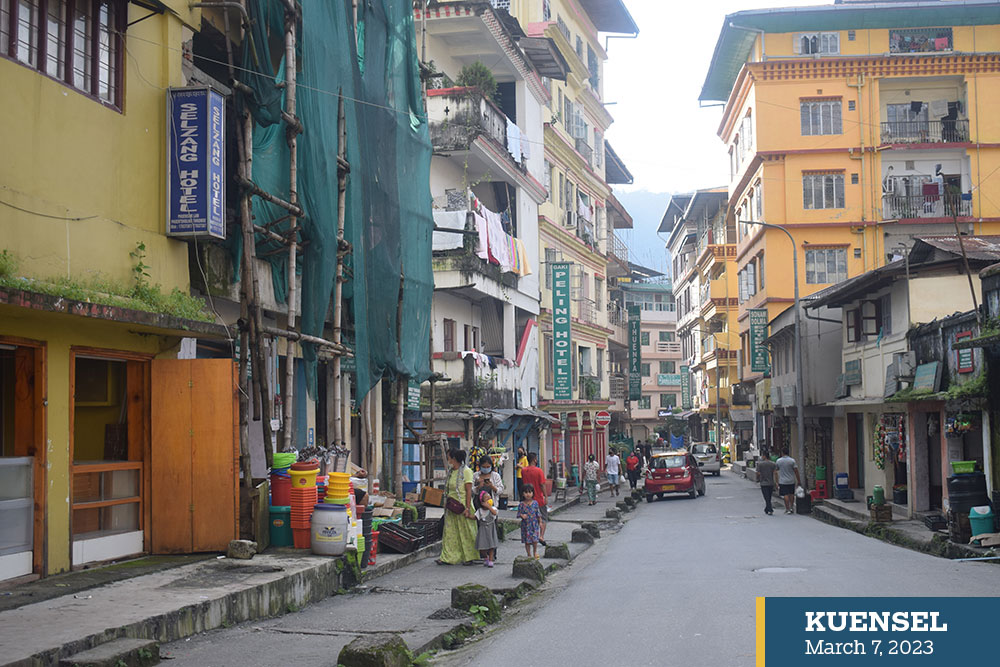Thukten Zangpo
The talk about granting full human and financial autonomy to the thromdes for the collection of revenue and planning their own expenditure has been doing the rounds for many years now.
However, with the enforcement of the Property Tax Act of Bhutan 2022, thromdes’ autonomy looks and sounds more far-fetched since the land and building taxes will be collected by the central government.
According to the Property Tax Act of Bhutan 2022, all taxes, including penalties, payable under the Act should be deposited into the government revenue account.
Finance Minister Namgay Tshering during the introduction of the Property Tax Bill in the recent session of Parliament said that the government would centralise the tax collection and redistribute it to the local governments.
“Thimphu Thromde’s tax revenue can cover 100 percent of its current expenditure while Samdrupjongkhar’s revenue would be adequate for only 30 percent,” he then added.
The Act was passed by Parliament in the winter session last year and has come into force from January 1 this year.
The revision of the value-based taxes by 0.1 percent is expected to bring millions to the government coffer.
Currently, the thromdes have partial autonomy in revenue collection—the thromdes’ capital budget is met through the earmarked block grant from the finance ministry.
Thromdes today also maintain internal revenue collected through taxes, fees, and service charges in a separate CD account. Land tax is the major contributor to the revenue.
The thromdes collect several taxes such as land tax, vacant land tax, property transfer tax, rentals from government properties such as leased land, sheds, houses, fees, and penalty and service charges, among others.
According to the Local Government Act 2009, the thromde tshogde has the financial power to review and approve the annual budget to be met from its internal resources and review and endorse budget proposals for submission to the finance ministry funding when necessary.
It added that the thromde tshogde has the financial authority to use its budget, grants, local fees, service charges, fines and taxes.
This internal revenue is adequate only to meet operation and maintenance costs of offices, including the salary for the staff, thrompons say.
Thimphu Thrompon Ugyen Dorji said that if the central government commits to providing the budget (capital and recurrent) required for the thromde services, it is not a problem. “But if the allotted budget from the government cuts drastically, it would affect the services.”
He added that the tax revision was aimed at generating more income from the urban areas to plough back to improve the services and maintain thromde’s sustainability in near future.
Municipalities have financial autonomy globally. However, we are going backward, Ugyen Dorji said.
“Centralised budget system would be against thromde’s financial autonomy and self-sustainability. If we have financial autonomy, we can take care of the human resource (HR) and services,” he said.
Thimphu Thromde collects revenue of at least Nu 250 million (M) in a year.
“With the revenue generated from the new tax revision, Thimphu Thromde will not have to ask the government for the capital budget,” Ugyen Dorji said, adding that the government could focus on other development areas.
Phuentsholing Thrompon Uttar Kumar Rai said that without financial autonomy, there is no HR autonomy for the thromdes.
“People have grievances and they bring them to thrompons. However, the thrompons do not have the authority to fix the system,” he added.
Thromdes’ executive secretaries (ES) do the rating for the thromdes’ officials, Uttar Kumar Rai said, adding that HR autonomy is a tool to fix to improve the thromde services.
“If the relationship between the thrompon and ES does not go well in the future, it could also hamper the developmental activities,” Uttar Kumar Rai said.
He added that without the financial authority and incentives, there would not be a sense of ownership among the thromde officials. “Those who are willing to go extra miles to generate extra revenue might not be inspired.”
Phuentsholing Thromde received Nu 181M as a block grant for fiscal year 2022-2023 from an estimated Nu 400M to be allocated in the fiscal year as per the 12th five-year plan.
“If the capital budget we get is not adequate, the thromde has to wait for the next fiscal year,” Uttar Kumar Rai said, adding that many ad hoc services are executed from thromde’s internal revenue.
Out of 11 local area plans (LAPs) in Phuentsholing Thromde, nine require development of basic amenities like roads, water, electricity, drainage, and footpath, he said. “The recurring expenditure will increase with the completion of 11 LAPs because requirements for maintenance.”
Phuentsholing Thromde collects revenue of at least Nu 100M in a year from taxes, fees, and charges.
Gelephu Thrompon Tshering Norbu said that the revenue collected is not enough to cover the infrastructure development in the thromde and often there are shortfalls in covering the recurrent expenditure.
“Developmental activities and services depend on budget,” he said, adding that the thromde residents need good footpaths, good roads and 24 hours water supply, among others.
Gelephu Thromde proposed for a Nu 661M block grant in the fiscal year 2022-23 but received only 60 percent from the government.
“If the government collects and redistributes the revenue from the thromdes, layers would be created. This will delay the provision of critical services to the residents,” Tshering Norbu said.
He said that it would be convenient to keep the revenue generated from the taxpayers at the local level without having to seek approval from the finance ministry. “Otherwise, thromdes have to depend more on the government,” he said.
There is not huge collection in Samdrupjongkhar Thromde because of the small population and area and has to depend entirely on the government for the development budget, Samdrupjongkhar Thrompon Thinley Namgay, said.


